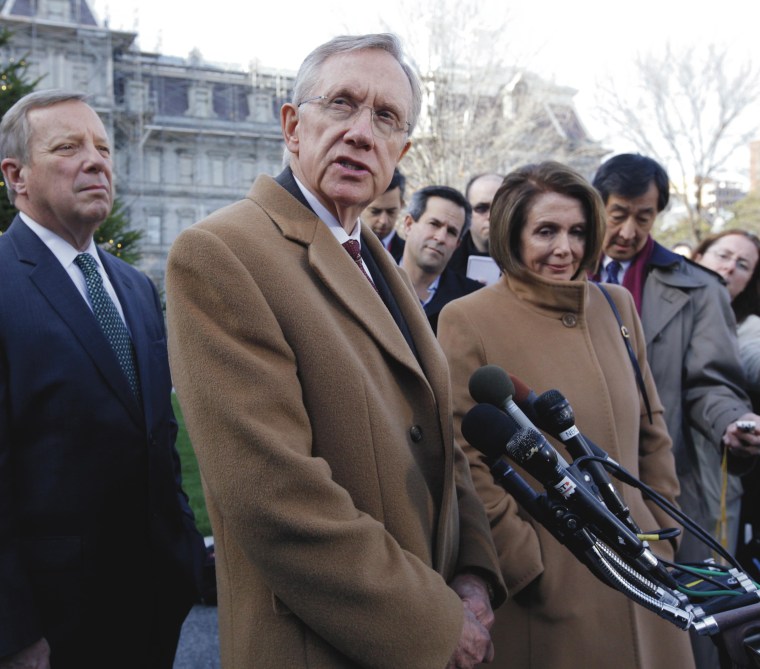Congressional Democrats and President Barack Obama started work in earnest Tuesday on difficult issues still standing in the way of their national health care overhaul after months of tortuous debate. Topping the list: How to help Americans pay for insurance premiums.
Republicans weren't invited, and they complained that the Democrats intended to deliberate behind closed doors — though lawmakers often do so in the final stages of such complex legislation. Separately, the head of C-SPAN, the nonpartisan public affairs network, called for letting the sun shine in on the discussions — as Obama once had promised.
House Democrats face the virtual certainty that they will not get the government-run insurance plan liberals had sought, a point Speaker Nancy Pelosi acknowledged.
"There are other ways to do that, and we look forward to having those discussions," she told reporters.
The president wants to sign sweeping legislation to extend insurance coverage by the time of his State of the Union speech, expected in early February. Separate bills passed by the House and Senate would require nearly all Americans to get coverage and would provide subsidies for many who can't afford the cost — but they differ on hundreds of details. Pressure to get a final bill means Democratic congressional leaders are likely to bypass formal negotiations as they reach for a deal.
Pelosi, D-Calif., met Tuesday with senior Democrats to go over the major issues. Pelosi and Majority Leader Steny Hoyer, D-Md., were to meet with Obama at the White House late in the afternoon, with Senate Majority Leader Harry Reid, D-Nev., and Sen. Dick Durbin, D-Ill., joining by telephone.
In exchange for losing the federal "government option," House Democrats say they intend to press the Senate to make premiums more affordable for Americans. The outcome of the talks could mean savings of hundreds of dollars for families buying coverage through new insurance supermarkets created by the legislation.
Pelosi said she wants the final product "to ensure affordability for the middle class, accountability for the insurance companies, (and) accessibility by lowering costs at every stage.
The House and Senate "are going for the same goal — hold down costs," said Rep. George Miller, D-Calif., chairman of the Education and Labor Committee.
White House officials say the bills have 95 percent in common. Maybe so, but the remaining issues could be hard to resolve in the few weeks Obama has in mind. Among them: whom to tax, how many people to cover, how to restrict taxpayer funding for abortion, whether illegal immigrants should be allowed to buy coverage in the new markets with their own money. The list goes on.
Concerns about affordability are paramount. Major subsidies under the bills won't start flowing to consumers until 2013 at the earliest. Even with federal aid many families would still face substantial costs.
The House bill would provide $602 billion in subsidies from 2013-2019, covering an additional 36 million people.
The Senate bill would start the aid a year later, providing $436 billion in subsidies from 2014-2019, and reducing the number of uninsured by 31 million.
The House would provide much greater financial help for households making as much as three times the federal poverty level, $32,490 for an individual, $66,150 for a family of four, according to a side-by-side analysis prepared by House Democratic staffers.
The Senate bill would provide greater assistance for households one rung up the income ladder, making between three and four times the federal poverty level, or up to $43,320 for an individual and $88,200 for a family of four.
The differences can add up.
For example, under the House bill, a family of four making $44,100 would pay no more than $2,425 a year to buy coverage in the new insurance markets. Under the Senate bill, premiums would be higher, $2,778.
The gap between the two bills involves greater out-of-pocket costs, including deductibles and copayments. For the same family, the House bill would cap out-of-pocket expenses at $4,000 a year. Under the Senate bill, it could be far more, $6,150.
But sweetening the deal for low- and middle-income households could require more taxes to pay for additional subsidies. And the House and Senate are also at odds over whom to tax. The House wants to raise income taxes on individuals making over $500,000 and couples over $1 million. The Senate would slap a new tax on high-cost insurance plans. Although the Obama administration supports the Senate's insurance tax as a cost saver, labor unions that contribute heavily to Democratic candidates are dead set against it.
There could be common ground in a Senate proposal to raise Medicare payroll taxes on individuals making more than $200,000 and married couples over $250,000. "The Medicare approach taken in the Senate bill may provide the kind of path forward that gets to compromise," said Rep. Chris Van Hollen, D-Md., a member of the House leadership.
Democrats reacted defensively to criticism that they are taking the final, most crucial stage of the debate behind closed doors. "We will continue to keep the American people informed, as we have in the earlier stages," Van Hollen said, noting that hundreds of hearings and town hall meetings have been held.
But Obama as a candidate pledged during a presidential debate in January 2008 that he would be "bringing all parties together, and broadcasting those negotiations on C-SPAN so that the American people can see what the choices are."
That has not occurred, and C-SPAN is taking note. The network released a letter Tuesday from chief executive Brian Lamb to congressional leaders asking for the talks to be opened to cameras.
"Now that the process moves to the critical stage of reconciliation between the chambers, we respectfully request that you allow the public full access, through television, to legislation that will affect the lives of every single American," Lamb wrote in the Dec. 30 letter.
